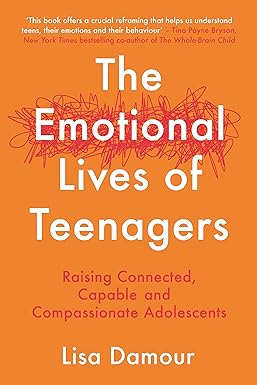
In the fast-paced journey of adolescence, where academic pressures, social dynamics, and self-discovery take center stage, the importance of proper nutrition often takes a backseat. Yet, the impact of making healthy food choices on your teen’s mental health is profound and cannot be ignored. Nutrition and teen mental health are inextricably linked, and it is vital that teens get all the vitamins and nutrients they need for their mental and emotional wellbeing.
Nutrition and Its Role in Teen Mental Health
Nutrition plays a pivotal role in the complex landscape of teen mental health, acting as a silent architect shaping cognitive functions, emotional well-being, and resilience. During the formative years of adolescence, when rapid physical and psychological changes are underway, providing the body and mind with the right nutrients becomes paramount. Essential elements like omega-3 fatty acids, vitamin D, B vitamins, and iron contribute to neurotransmitter synthesis, regulate mood, and support cognitive function.
The delicate balance between nutritional intake and mental health becomes even more critical, as inadequate nutrition during this phase can exacerbate the risk of mental health issues such as anxiety, depression, and mood swings. Recognizing the profound impact of nutrition on the developing teen brain underscores the importance of fostering healthy eating habits that not only nurture physical growth but also lay the groundwork for robust mental well-being in our young people.
4 Nutrients That are Important for Teen Mental Health
Certain nutrients play a crucial role in supporting mental health during the formative years of adolescence. These include lean meat, brown rice, whole grains, and a variety of fruits and vegetables. These foods provide essential vitamins, minerals, and dietary fiber necessary for optimal brain function. Listed below are some of the most important vitamins and minerals needed for healthy eating in a teenage diet.
- Omega-3 Fatty Acids: Found in fish, flaxseeds, and walnuts, omega-3 fatty acids are crucial for brain function and can contribute to alleviating symptoms of depression and anxiety.
- Vitamin D: Essential for bone health, vitamin D also plays a role in regulating mood. Exposure to sunlight and consumption of vitamin D-rich foods like fortified dairy products and fatty fish are essential.
- B Vitamins: B vitamins, particularly B6, B9 (folate), and B12, are vital for neurotransmitter synthesis, helping to regulate mood and reduce the risk of depression.
- Iron: Iron deficiency can lead to fatigue and cognitive impairment, affecting a teen’s ability to concentrate and function optimally.
Signs That Your Teen’s Mental Health May Be Affected By Their Diet
Recognizing the signs that a teen’s cognitive health and development may be compromised due to their diet is vital for early intervention. Watch out for the items listed below as these could be indicators of nutritional deficiencies.
- Fatigue and low energy levels
- Difficulty concentrating or poor academic performance
- Irritability and mood swings
- Changes in sleep patterns
- Withdrawal from social activities
4 Common Mental Health Issues Related to Poor Nutrition for Teens
The journey through adolescence is often characterized by a myriad of challenges, and one often overlooked aspect is the profound connection between eating healthy meals and mental wellness in teens. In the hustle and bustle of teenage life, healthy choices in diet can play a crucial role in shaping not only physical well-being but also the intricate landscape of the teenage brain. This exploration delves into common teen health issues that are intimately related to poor nutrition and diet quality, unraveling the intricate interplay between what teens eat and how it influences their emotional and cognitive well-being.
1. Anxiety and Stress
A nutrient-poor diet, particularly high in saturated fat and sugars, has been linked to heightened anxiety and stress levels among teenagers. The impact of such dietary choices on cortisol levels underscores the intricate connection between what teens eat and their susceptibility to increased feelings of unease and stress.
2. Depression
The intricate relationship between depression and unhealthy eating habits is firmly established. Incorporating nutrient-rich options, particularly those abundant in omega-3 fatty acids from sources like fish, along with protein-rich foods, not only addresses nutritional needs but also fosters a positive impact on mood and emotional well-being, providing a holistic approach to combating depressive symptoms.
3. Poor Cognitive Function
Insufficient intake of essential nutrients can hamper cognitive function, diminishing a teenager’s capacity to focus and excel in both academic endeavors and extracurricular activities. A well-balanced, healthy diet, rich in necessary nutrients, becomes not only a key factor in maintaining physical health but also a fundamental contributor to cognitive acuity and academic success.
4. Mood Swings and Low Self-Esteem
Fluctuations in blood sugar levels, often provoked by an unhealthy diet, can give rise to unpredictable mood swings in teenagers. These erratic emotional states not only influence their overall emotional health but also play a pivotal role in shaping self-esteem, influencing how teens perceive themselves and navigate their social interactions.
Related: Why Teens Lack Motivation And How To Help Your Teen Be More Motivated
5 Unhealthy Eating Habits Common in Today’s Youth
To address the root causes of poor cognitive health in teens, it’s crucial to recognize and comprehend just how much healthy habits (and more importantly, unhealthy ones) shape their dietary choices. From excessive sugar consumption and reliance on fast food to overindulgence in caffeine and emotional eating, pinpointing these habits provides a foundation for developing targeted interventions and promoting healthier alternatives to nourish both the body and mind.
1. Excessive sugar consumption
Teens often consume excessive amounts of sugary foods and sugar-sweetened beverages, including fruit juice and sugary soft drinks, contributing to energy spikes and crashes, affecting mood and concentration.
2. Fast food and processed foods
Frequent consumption of fast and junk food, and processed foods can lead to nutrient deficiencies and an imbalance in the body’s overall health.
3. Overconsumption of caffeine
High levels of caffeine intake, often through energy drinks, can disrupt sleep patterns and contribute to heightened anxiety levels.
4. Inadequate hydration
Dehydration can impair cognitive function and exacerbate feelings of fatigue and irritability in teens.
5. Emotional eating
Using food as a coping mechanism for emotional distress can establish unhealthy patterns that persist into adulthood.
Related: Eating Disorders Are on the Rise: Five Important Things Parents Need to Know
7 Tips to Improve Your Teen’s Mental Health with Healthy Foods
Now that we’ve explored the potential pitfalls when it comes to food consumption and understand how nutrition and teen mental health are connected, let’s focus on proactive steps parents, educators, and teens themselves can take to foster a healthier relationship between nutrition and mental well-being.
1. Encourage Eating Healthy
Promote eating balanced meals that include lean meats, whole grains, fruits, and vegetables from each food group. Include sources of omega-3 fatty acids, such as fish, chia seeds, and walnuts, in their diet. Additionally, incorporate foods rich in vitamin D, such as fortified dairy products, eggs, and fatty fish, to support both bone health and mood regulation. These essential fats are known to support brain function and may contribute to reducing symptoms of depression and anxiety, as well as promote healthy weight.
Further, encourage healthy snacks such as fresh fruit, orange vegetables, and nuts. These options not only provide essential nutrients and follow recommended dietary guidelines but also contribute to a stable blood sugar level, preventing mood swings. Healthy eating ensures a diverse range of nutrients that support both physical and mental health.
2. Prioritize Physical Activity
Regular physical activity complements a healthy diet, promoting overall well-being and aiding in the prevention of mental illness.
3. Educate on Food Choices
Equip teens with the knowledge to make informed food choices by teaching them to read food labels. Understanding a nutrition facts label empowers them to eat healthy foods and make healthy lifestyle choices.
4. Hydration Matters
Encourage teens to stay adequately hydrated by drinking water throughout the day and sports drinks after any physical activity. Dehydration can contribute to fatigue, cause headaches and affect cognitive function.
5. Limit Sugary and Processed Foods
Reduce the intake of sugary snacks, fast food, and processed foods. Instead, opt for nutrient-dense alternatives, like whole grain bread, low fat milk, citrus fruits as well as a variety of foods made with coconut oil for a healthy snack, to support both physical and mental health.
6. Foster a Positive Relationship with Food
Promote a healthy attitude towards food, emphasizing its role in nourishing the body and mind rather than viewing it as a source of comfort or stress relief.
7. Seek Professional Guidance
If concerns about a teen’s nutrition and mental health persist, seeking guidance from healthcare professionals or registered dietitians can provide personalized strategies for improvement. If left unchecked, poor nutrition in the teenage years can lead to type 2 diabetes, heart disease, obesity/high body weight, and other serious health concerns in adulthood.
By incorporating these tips into their daily lives, teenagers can build a strong foundation for both physical and mental well-being, setting the stage for a healthier and more resilient future.
Healthy Eating is the Key To Happy Teens
In conclusion, the link between nutrition and teen mental health is undeniable. By prioritizing healthy eating habits, your child can lay a foundation for lifelong well-being, ensuring that they navigate the challenges of adolescence with resilience and vitality. It’s time to recognize the power of food in shaping the minds and futures of our teens.
For additional tips and resources to help you navigate parenting teens, we recommend The Emotional Lives of Teenagers by Lisa Damour, which provides valuable insight into the intense emotions of adolescents.

Parenting teenagers is a tough job, but you’re not alone. Here are some posts that might help:
Dear Parents: You Are Not a Failure-It’s Just Hard Raising Teenagers
10 Must-Listen To Podcasts for Parents of Teens
This is What To Say And Do When Your Teen Is In A Funk
*This post contains affiliate links where we may earn a small commission for purchases made from links in this post.






Leave a Comment